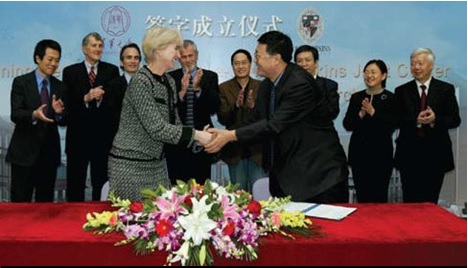
One of the four focus points of the Whiting School’s Strategic Plan is a commitment to local and global strategic partnerships throughout academia and industry. Illustrating that commitment are two recent partnerships between the Whiting School and universities in China.
This past January, a delegation from the Whiting School traveled to China to participate in a successful joint bioengineering symposium. Attending the event along with Dean Nick Jones were Andrew Douglas, vice dean of faculty; Elliot McVeigh, director of Biomedical Engineering; Hedy Alavi, assistant dean for international programs; and professors Nitish Thakor, Jin Kang, Xiaoqin Wang, Joel Bader, Gislin Dagnelie, and Hai-Quan Mao.
The symposium was co-hosted by the Whiting School and the Shanghai Jiao Tong University College of Life Science and Technology, after a partnership was formed between the two schools last May. Founded in 1896, Jiao Tong is one of the oldest universities in China, with over 200 of its alumni belonging to China’s Academy of Sciences and Academy of Engineering. By forming this partnership, the universities aim to promote academic interaction and joint research between faculty and students in the area of bioengineering.
At its core, the agreement supports a Collaborative Ph.D. Student Agreement, enabling PhD students from the two universities to participate in one to two semester-long exchange programs and supports symposiums, such as the one held recently in China.
In May of last year, Ronald Gue ’62, PhD ’64, chairman of Phoenix Health Systems Inc. and a member of the National Advisory Council for the Whiting School of Engineering, visited Shanghai Jiao Tong University while he was on a trip to China. Gue, who earned his PhD from the Whiting School in Operations Research and Industrial Engineering, met with Professor Jin Wei, director of International Cooperation & Exchange, as well as the faculty of the Biomedical Engineering Department, on behalf of the National Advisory Council to reinforce Johns Hopkins’ commitment to international outreach and the partnership with Shanghai Jiao Tong University.
Also this past January, the Department of Biomedical Engineering and Tsinghua University, one of China’s premier research universities, established the Tsinghua–Johns Hopkins Joint Center for Biomedical Engineering Research. That month, Provost Kristina Johnson joined Jones, Douglas, McVeigh, and Wang in a ceremony in Beijing to sign a memorandum of agreement between the two universities.
To be housed on Tsinghua University’s campus in Beijing, the center will provide joint research projects, exchange of visiting scholars and students, joint educational initiatives, and conferences. Its research focus includes neuro-engineering and neuroscience, medical imaging,
tissue engineering, and biology in medicine. At the heart of the program is an undergraduate exchange program that will enable students from Johns Hopkins and Tsinghua to spend summers at each other’s campuses, working on collaborative research projects.
Additionally, many of Tsinghua’s doctoral students and faculty will travel to Baltimore to study in the labs of Johns Hopkins or work as visiting scholars, while Johns Hopkins faculty will spend semesters in Beijing teaching at Tsinghua or studying during sabbatical leave. A final component of the center is the joint research symposia, which will be held regularly and be open to participating faculty and students from both universities.
The two schools have shared a history since the 1920s, when William Henry Welch, the first dean of the Johns Hopkins School of Medicine, traveled to China and was instrumental in founding the Peking Union Medical College, the medical school of Tsinghua University. For the past decade, Johns Hopkins and Tsinghua have had an informal but strong working relationship, and the center, three years in the making, has formalized that commitment.
“The commitment in China to the development of a world-class research enterprise is extraordinarily impressive. The opportunities this presents to our students and faculty are very broad and dynamic,” says McVeigh.
“The opportunities for collaboration,” adds Jones, “particularly in the field of bioengineering, have been increasing in the past decade.
As we partner with our colleagues across the globe in countries such as China, we vastly increase our ability to share ideas, conduct groundbreaking research, and contribute toward the betterment of all society.”




